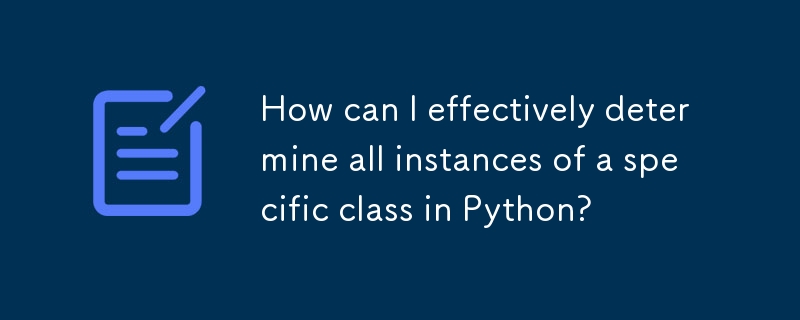ホームページ >バックエンド開発 >Python チュートリアル >Python で特定のクラスのすべてのインスタンスを効果的に特定するにはどうすればよいですか?
Python で特定のクラスのすべてのインスタンスを効果的に特定するにはどうすればよいですか?
- Mary-Kate Olsenオリジナル
- 2024-11-01 08:26:02555ブラウズ

Python でのクラスのインスタンスの決定
Python では、クラスは、個別のエンティティを表す属性とメソッドのセットをカプセル化できます。 Python インタープリターは特定のクラスのインスタンスに対する洞察をネイティブに提供しますが、これらのインスタンスを出力するためにカスタマイズされたアプローチが必要なシナリオもあるかもしれません。この記事では、この目的を達成するための効果的なソリューションについて説明します。
ガベージ コレクション メソッド
Python のガベージ コレクターは、クラスの既存のインスタンスをすべて識別するのに役立ちます。この方法では、メモリ内のすべてのオブジェクトの包括的なリストを提供する gc モジュールを利用します。このリストを反復処理することで、特定のクラスのインスタンスを分離し、必要に応じてさらに処理することができます。
<code class="python">import gc
for obj in gc.get_objects():
if isinstance(obj, some_class):
# Perform desired operations on 'obj'</code>
Mixin および Weakrefs アプローチ
代替案このアプローチには、mixin クラスと弱い参照の利用が含まれます。この方法は、クラス インスタンスを追跡するための集中メカニズムを確立し、動的に作成されたインスタンスであっても包括的にカバーできるようにします。弱参照は、プログラム内の他の場所でアクティブに参照されなくなったインスタンスを適切に処理できるようにするため、ここでは非常に重要です。
<code class="python">from collections import defaultdict
import weakref
class KeepRefs(object):
# Dictionary to store weak references to class instances
__refs__ = defaultdict(list)
def __init__(self):
# Add weak reference to self within class-level dictionary
self.__refs__[self.__class__].append(weakref.ref(self))
@classmethod
def get_instances(cls):
# Iterate through weak references and return valid instances
for inst_ref in cls.__refs__[cls]:
inst = inst_ref()
if inst is not None:
yield inst
class X(KeepRefs):
def __init__(self, name):
# Invoke base class constructor with required parameters
super(X, self).__init__()
self.name = name
# Create instances of class X
x = X("x")
y = X("y")
# Retrieve and print instance names
for r in X.get_instances():
print(r.name)
# Remove one of the instances
del y
# Re-retrieve and print remaining instance names
for r in X.get_instances():
print(r.name)</code>
印刷されたインスタンスの特定の書式設定は、for ループ内でカスタマイズできます。個々の要件に基づいて希望のプレゼンテーションを行います。
以上がPython で特定のクラスのすべてのインスタンスを効果的に特定するにはどうすればよいですか?の詳細内容です。詳細については、PHP 中国語 Web サイトの他の関連記事を参照してください。

